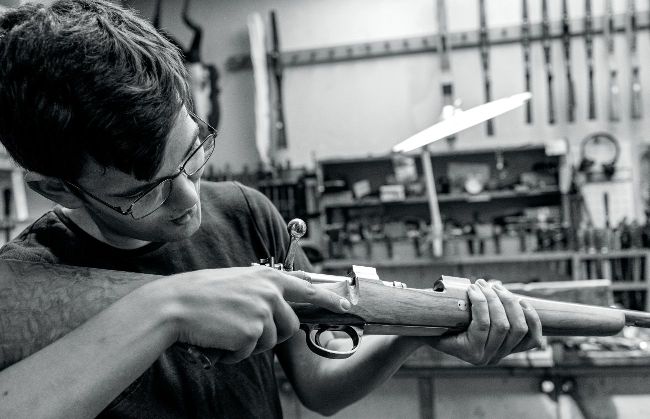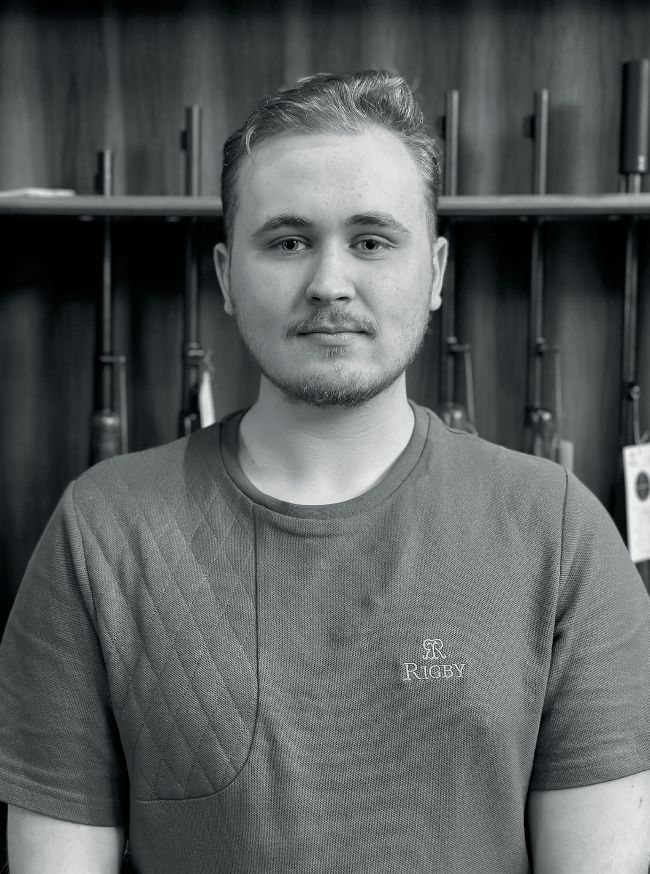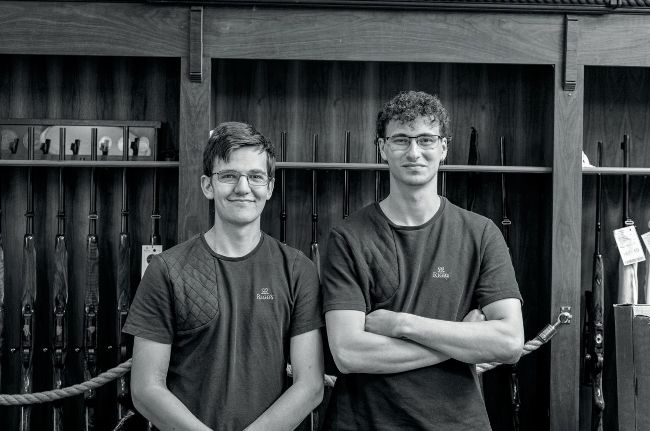
Morgan has been very busy recently, working on preparations for the recent 250th anniversary event.
MORGAN THOMAS: FROM WORK EXPERIENCE TO PRODUCTION ASSISTANT AT RIGBY
Morgan Thomas grew up in rural Oxfordshire with a passion for shooting and engineering, a combination that eventually led him to pursue a career in gunmaking. “I’m more of a doer,” he explains. “University wasn’t for me. I decided to look for apprenticeships and thought, why not combine the two things I love - guns and engineering?”
That journey started with a visit to the Game Fair, CVs in hand. “I walked along Gunmakers’ Row and got chatting to Rigby,” says Morgan. “I did some work experience and that’s where it all began.”
Now working as a production assistant,
Morgan’s role is both varied and central to the operation. “Day to day, I’m shipping parts to outworkers or heat treatment, managing outsourced labour and increasingly working with Jamie, our production manager, on standardising systems as we get ready to move into a new facility.”
Much of his recent work focused on the company’s milestone 250th anniversary event. “It was a huge task. I helped coordinate which guns were going where, ensuring they came back safely. It’s something I’ll carry with me forever, just to be part of that celebration was unforgettable.”
When asked if he enjoys the job, Morgan doesn’t hesitate. “I absolutely love it. It’s the perfect size of company, big enough to have pride in your work but small enough that you know everyone’s name. There’s a great sense of shared passion across the team.”
That shared passion, he says, extends beyond Rigby itself. “Yes, there’s competition in the trade, but there’s also unity. We all love the craft and care deeply about the industry.”
In terms of skills, Morgan has learned that adaptability is crucial. “I came straight from school, and it’s been a real learning curve. Seeing a rifle come together from raw components to finished product is incredibly rewarding.”
He believes the industry could do more to reach young people. “There’s a tendency to advertise roles only to those already interested in guns. But there’s so much more to it, design, engineering, artistry. Opening it up to a wider audience could help bring in more talent.”
When the conversation turns to the upcoming lead ammunition ban, Morgan is cautiously supportive of the environmental motivations, particularly for wetland areas, but shares concerns about the trade’s ability to adapt. “Steel is tougher on barrels. There’s still a lot of detail that needs addressing. The transition period is key. We can’t afford to rush it.”
Looking ahead, Morgan hopes to follow a similar path to his mentor Jamie Holland, moving from the bench into production management. “I love seeing the big picture, watching a rifle take shape across every stage. That’s where I see myself growing.”

Kai Burridge grew up around the gun industry.

Morgan Thomas (left) and Tom Allen are deeply passionate about their jobs at Rigby.
TOM ALLEN: FROM JEWELLERY TO FULL-COVERAGE RIFLES
Tom Allen’s route into Rigby’s London workshop is far from typical. Originally a jeweller, he specialised in silversmithing, engraving rings, pendants and custom items, before discovering the world of gun engraving. “I was looking to progress in engraving and stumbled across gun engraving online. As soon as I saw it, I knew it was the top end of the craft.”
Tom’s first contact with Rigby came through the Hand Engravers Association. “I came for a trial day, met Saija Koskialho, my boss, and they were looking for an apprentice. I was very lucky with the timing.”
Now 18 months into his apprenticeship, Tom is thriving. “There’s usually a long-term project on the go and then day-to-day tasks, like inlays, engraving screws or touching up marks from handling.”
His standout moment so far? Engraving a full-coverage gun for Rigby’s 250th anniversary event. “It was my first major piece and took around five to six months. Not many companies would give someone so early in their training that level of responsibility. It was incredibly rewarding.”
Working under a microscope all day isn’t for everyone, but Tom enjoys the focus and rhythm of the job. “You really have to get into the zone, but the workshop gives you the space and time to do that properly.”
He credits the team at Rigby for fostering an environment where apprentices can flourish. “Marc Newton is hugely inspiring. He was my age, 25, when he began at Rigby, and now look where the company is. He often reminds me of that. Saija and Geoffrey Lignon, our in-house engravers, have also been brilliant.”
Tom believes the gun trade needs to shout louder about the opportunities it offers. “If I hadn’t stumbled across this, I would never have known it existed. There are so many interesting jobs, engraving, stocking, actioning, but very few of them are advertised publicly.”
He also sees potential in widening the trade’s cultural appeal. “The UK tends to be more reserved than, say, the US. But shooting isn’t just game days, it’s clays, targets, different disciplines. There’s something for everyone.”
Looking to the future, Tom is focused on mastery. “There are levels to engraving. The speed and quality of our experienced engravers is something I really look up to. My goal is to get there slowly, one project at a time.”
KAI BURRIDGE: A FAMILY LEGACY CONTINUES AT RIGBY
For Kai Burridge, the gun trade is more than a profession, it’s a lifelong environment.
“My journey began very early on in my life. I grew up with my Father being a gunsmith, running his own business from home. Finding him working on rifles or shotguns or with him being a Section 5 authority it wasn't uncommon to see him working on other far more interesting pieces. Growing up around that really sparked my passion for firearms from a very young age.”
After school, Kai spent four years working in a local gun shop, supporting orders, repairs and occasionally helping on the sales side. “I loved it, I was good at it too.” But when the time came to advance his skills, he made the leap to join Rigby as an apprentice, something he describes as a natural next step for someone with ambition and hands-on experience.
Now under the mentorship of Thomas le Jendre, Kai is immersed in learning the fundamentals of the bench. “My role at this time as an Apprentice is still primarily learning from my mentor, working on series of parts until
I reach a satisfactory and most importantly consistent level of finish on the parts.”
Despite the heritage of the Rigby name, Kai finds more inspiration than pressure in the work. “It honestly is quite an honour, it almost feels a little bit of a brag when I tell people what I do for work. There is some pressure because the customer expects something worth the price they are paying for their rifle or shotgun but I would say that it also keeps you in check, it provides that little kick to take it that one step further to deliver perfection. ‘That'll be good enough’ just isn’t acceptable in our workshops, perfection is the only acceptable standard, and when you get that part you are working on just right it fills you with a pride that just can’t be matched.”
When asked about key influences since joining the company, Kai names two people without hesitation. “I would definitely say there's two people, one obviously is my mentor, Thomas Le Gendre who in himself is a phenomenal gunmaker and learning from him is really awesome, he is a fantastic teacher. The other is the director, Marc Newton, who also came into the trade from a similar age to myself.”
Technically, the most valuable skill he’s picked up so far is one that might surprise those outside the trade. “The ability to file flat. It sounds easy on paper, but it can be tricky to master. Some can never get it. But in general, I would say the most valuable lesson is learning that making mistakes is okay, that learning how to fix them is probably 50% of gunmaking. It's never ideal to make a mistake but it is inevitable, everyone has a story on how they broke a part or a tool in the process of making something.”
He points to two projects that stood out during his early training. “The two that stand out to me are the first tool and last tool I made as part of my initial training. The Hammer I made in my first month is something which will last a lifetime and will go everywhere with me. It encompassed all the skills I had learned at the time; filing, sanding, measuring, woodwork, heat treatment and introduction to the machine tools. The last being my Spring clamp which was incredibly fun to make, and required a lot of independence on my part, utilising the mill and the lathe to create parts which all fit together to work properly. Making screws and even having one of the engravers carve my initials into the handle. Culminating in finally working with one of the Finishers here, Daniel Rivers, to black finish my tool.”
On the subject of attracting more young people into the industry, Kai is direct. “Make the opportunities more visible! The whole gun trade is crying out for new blood and apprentices but no one other than Rigby’s actually advertises that fact. If other companies made it more aware then I guarantee you that there is no shortage of young men and women who would love to learn the trade, whether it's engraving or actioning or stocking or one of the many subcategories of the trade, just advertise the fact.”
Looking forward, Kai has a clear roadmap. “So, the next 4-ish years are going to be spent on the bench learning all the different aspects of gunmaking, whether that be bolt guns, falling blocks, double rifles and shotguns. Once I have moved on from that and have my fancy piece of paper from the Worshipful company of Gunmakers, I would like to stay at Rigby’s and give back to the company that would've spent so much time and money and lost productivity to train me. I’ve always had a passion for bolt guns so I think that would be an area I would like to specialise in, and maybe one day, if the market is right and open for it and if the stars align just right, work for myself as my dad did. That's the dream anyway.”
A BRIGHT FUTURE WITH THE RIGHT SUPPORT
The stories of Morgan, Tom and Kai demonstrate that the British gun trade still holds enormous appeal for young people, when the right opportunities are made visible. Whether coming from rural shooting backgrounds, jewellery engraving or family workshops, each has found a path into Rigby through passion, persistence and the right mentorship.
Their experiences reflect an industry rich in heritage but reliant on fresh energy to survive. The key, as they unanimously agree, is in opening the door, whether that’s through advertised apprenticeships, outreach at trade fairs or simply better communication about what the trade has to offer.
For Rigby, the commitment to developing young talent appears stronger than ever and for these three rising stars, the journey has only just begun.